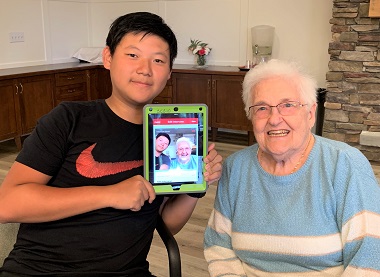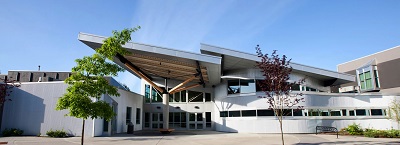
Recording the stories of seniors in the community.
Surrey Christian School is heavily involved with its surrounding community, and that distinguishing characteristic has been examined and documented by two local academics.
Dr. Adrienne Castellon and Dr. Allyson Jule, both professors at Trinity Western University’s School of Education, wrote three Pursuing Excellence in Christian Education case studies for Cardus.
The one involving Surrey Christian School involves Civic Engagement, while the other two focus on Environmental Education (St. Margaret d’Youville Catholic Elementary School, Hamilton, Ontario) and Indigenous Perspectives (Father Robinson Elementary School and Holy Cross High School, Saskatoon, Saskatchewan).
Following is a brief profile of the school, from the report:
- Name of school: Surrey Christian School
- Type of school: Christian independent school
- Grade Range of Students: preschool – grade 12
- Number of Students: 1,340
- Number of Staff: 175
- Location: Surrey, BC
- School’s mission statement: “Educating for wholeness, by engaging God’s world in the servant way of Jesus”

Surrey Christian School, primary campus.
Much of the report describes ways in which Surrey Christian students are engaged in the broader community:
Students of all grade levels take part in Surrey Christian’s local and global initiatives. Kindergarten and other elementary classes help care for a local park. Grade 3 students visited the Ocean Legacy Foundation, a local non-profit focused on reducing plastic pollution around coastlines, to learn about the biodiversity of tide-pool ecosystems.
One of the teachers involved in the trip highlighted the students’ enthusiasm following the experience: many of them suggested that the next year’s grade 3 class be taken to visit the Ocean Legacy Foundation as well.
Every couple of weeks grade 5 students assist with sorting and distribution at a nearby food bank. This experience has helped students to recognize their biases and challenged their stereotypes by fostering an increased appreciation for the dignity of all people through connection and service. Grade 5 students also host and meet monthly with refugee families in order to deepen their understanding of the idea of “community.”
Students in grades 6 and 7 have worked with municipal authorities to build benches in the City of Surrey. Not only did students benefit from this project by practicing professional communication skills, but the community also benefited from improved public spaces. Students are proud of their work because they believe it matters to others.
One teacher reported that the quality of student work improves because of the connection to the “real world.” Also, connecting with local community organizations can often be very easy when they share the same neighbourhood or similar goals. Physical and health-education students, for example, have used projects such as planning cooperative games and exercise opportunities as ways to build positive relationships with their neighbours.
Civic engagement is also emphasized at the high-school level. Surrey Christian secondary students are regularly involved at the public school as well, helping to teach physical-education classes, tutoring other students, making props for their musicals, and coordinating an inter-school sports program. Students in grade 11 biology work in a local fish hatchery. The photo and information-technology classes use their learning to help others by building websites for non-profit organizations in the community.
Surrey Christian also participates in an exchange program with one of British Columbia’s First Nations schools; students visit the reserve in Witset (approximately 700 kilometres north of Surrey) and learn from Indigenous students about their culture and way of being. . . .
The article carries on to describe many other ways in which Surrey Christian students are involved in “civic-engagement initiatives.”

Surrey Christian School, secondary campus.
Castellon and Jule identified several “key takeaways” from their study:
-
- It is important for schools to continually be asking how they matter to their neighbours in order to identify opportunities to have a positive impact on their communities.
- Charitable action in response to the gospel and developing active citizens are complementary efforts.
- Independent schools can work with neighbouring public schools to build connections and positive relationships.
- Fostering interfaith relationships and welcoming people who live in the community to school events help schools gain a deeper understanding of the surrounding community
- Civic engagement can be incorporated into all subjects and motivates students of all grade levels to excel by providing the opportunity to observe the real-world impact of their work.
- Investing in intensive professional development for a cohort of teachers each year, including built-in accountabilities and commitments, builds teachers’ capacity for civic engagement.
- The potential for misunderstandings and resistance can be mitigated by communicating openly with parents regarding civic-engagement initiatives.
- Building opportunities for regular collaboration, scheduling, and planning into teachers’ schedules gives teachers the time they need to prepare effective civic engagement programs.
Go here to read the full Surrey Christian School study.
